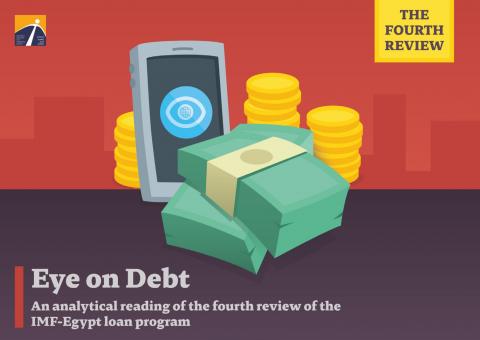Eye on Debt: An analytical reading of the fourth review of the IMF-Egypt loan program
Introduction
After a delay of about five months, the International Monetary Fund (IMF) completed the fourth review of the Extended Fund Facility Arrangement for Egypt, which Egypt signed in late 2022.
The review was delayed several times due to the IMF's strict conditions regarding exchange rate flexibility, as well as the country's plan for exiting from various economic sectors. The exchange rate flexibility condition led to a delay in the disbursement of the loan and its review throughout 2023, and later the asset sale program was the condition that delayed the issuance of the IMF’s reviews, including the fourth (latest) one.
The IMF completed its fourth review on 11 March, allowing the Egyptian government to withdraw $1.2 billion, bringing Egypt’s purchases under the program to $3.207 billion, out of the total agreed loan amount of $8 billion. The amount withdrawn represents about 40% of the initial value of the loan, and about 119% of the amount Egypt is allowed to borrow from the IMF, as the IMF announced in a statement that it approved the payment of the tranche associated with the fourth review in March.
The previous review, the documents of which have not been disclosed, also saw the approval to grant Egypt an additional $1.3 billion loan through the Resilience and Sustainability Facility (RSF), a loan that Egypt had previously applied for in late 2022. However, the approval of the loan by the IMF’s board was delayed until four reviews of the program were conducted.
The Egyptian government started implementing this program with the IMF at the end of 2022, and it was scheduled to end in September 2026. However, the situation has changed, and the program is expected to continue at least until the end of 2027. The government's delay in implementing the IMF’s conditionality was the main reason for the delay in conducting the reviews, but the release of the latest review was delayed at the request of the Egyptian government.
The conditionality did not change much in this review, although several conditions were added, the most important of which will be reviewed in this report. The IMF’s language also changed with regard to the implementation of structural reforms, especially the role of sovereign bodies in the economy. The Fund published a statistic on the number of military-owned companies operating in economic activities, pointing out that the army owns 97 companies, including 73 companies operating in the industrial sector, and has large shares in some sectors, such as the marble, cement and steel sectors, with an average of 36% of the market shares, which hinders the private sector's entry into these sectors, according to the IMF.
The IMF also noted what it called a "slowdown" in the implementation of the State Ownership Policy Document and added sub-indicators to track the implementation of these conditions.




